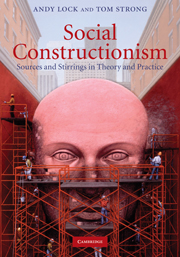Book contents
- Frontmatter
- Contents
- Preface
- Acknowledgements
- 1 Introduction
- 2 Giambattista Vico
- 3 Phenomenology
- 4 Hermeneutics
- 5 Marxism and language
- 6 Lev Vygotsky
- 7 Meanings and perspectives
- 8 Ludwig Wittgenstein
- 9 Gregory Bateson
- 10 Sociologies – Micro and Macro
- 11 Sources of the self
- 12 Michel Foucault and his challenges
- 13 Discourse analysis
- 14 Ken and Mary Gergen
- 15 Rom Harré
- 16 John Shotter
- 17 Concluding remarks
- Bibliography
- Index
3 - Phenomenology
Published online by Cambridge University Press: 05 June 2012
- Frontmatter
- Contents
- Preface
- Acknowledgements
- 1 Introduction
- 2 Giambattista Vico
- 3 Phenomenology
- 4 Hermeneutics
- 5 Marxism and language
- 6 Lev Vygotsky
- 7 Meanings and perspectives
- 8 Ludwig Wittgenstein
- 9 Gregory Bateson
- 10 Sociologies – Micro and Macro
- 11 Sources of the self
- 12 Michel Foucault and his challenges
- 13 Discourse analysis
- 14 Ken and Mary Gergen
- 15 Rom Harré
- 16 John Shotter
- 17 Concluding remarks
- Bibliography
- Index
Summary
Ah, not to be cut off
not through the slightest partition
shut out from the law of the stars
The inner – what is it?
if not intensified sky
hurled through with birds and deep
with the winds of homecoming.
(Rainer Maria Rilke 1995: 191)Phenomenology, as we will consider it, begins with the work of Edmund Husserl in the first three decades of the twentieth century. Its descendants include existential phenomenology, associated with Husserl's pupil, Heidegger – whose opacity makes Husserl look almost a paragon of clarity in comparison – and existentialism itself. Within the broad existential tradition the work of the French philosopher Maurice Merleau-Ponty has become recognized as important to present-day constructionist concerns in the broad sense. One of its other descendants, the social phenomenology of Alfred Schutz, has been a direct influence upon ethnomethodology, and thence discourse analysis in the broad sense. In addition, Schutz's legacy is centrally important in one of the founding documents of contemporary social constructionism, Berger and Luckmann's (1966) volume The Social Construction of Reality (Luckmann being a co-author with Schutz of The Structures of the Life-World (1973–89). Schutz grasped the principles of phenomenology sufficiently well to have been offered the position of Husserl's assistant in the 1920s (an offer he turned down). He notes that:
In certain quarters the phenomenologist is held to be a kind of crystal gazer, a metaphysician or ontologist in the deprecatory sense of the words, at any rate a fellow who spurns all the empirical facts … Others, who are better informed, feel that phenomenology may have a certain significance for the social sciences, but they regard the phenomenologists as an esoteric group whose language is not understandable to an outsider … And in regard to Husserl's phenomenology there are also several special difficulties. […]
- Type
- Chapter
- Information
- Social ConstructionismSources and Stirrings in Theory and Practice, pp. 29 - 52Publisher: Cambridge University PressPrint publication year: 2010



